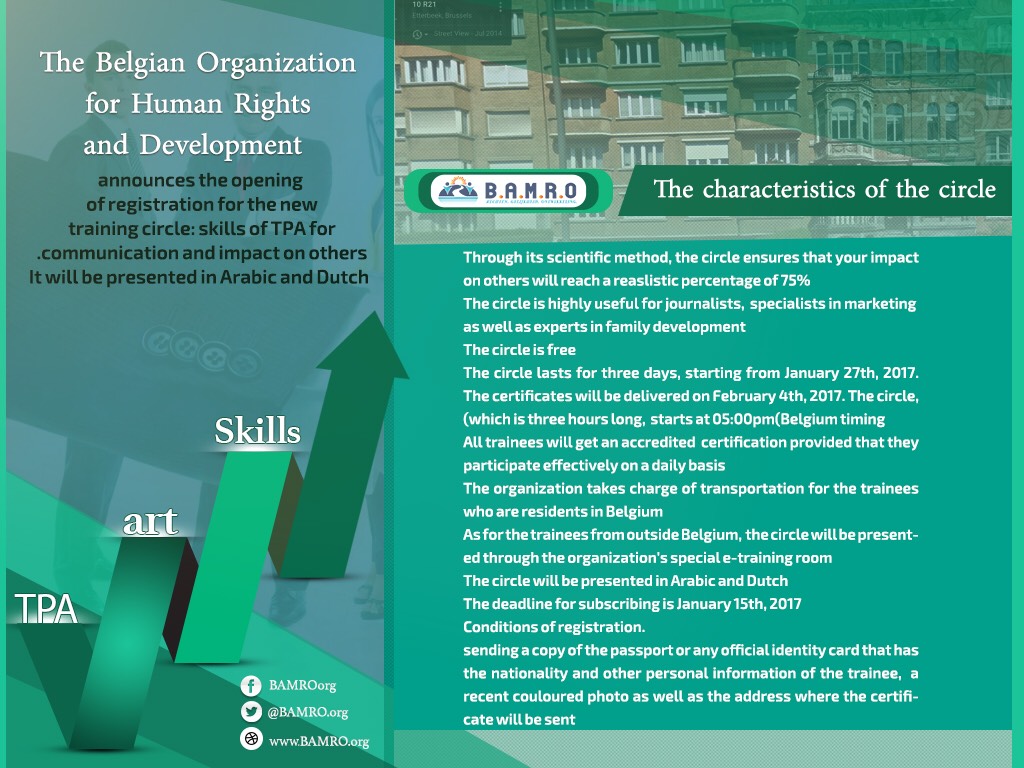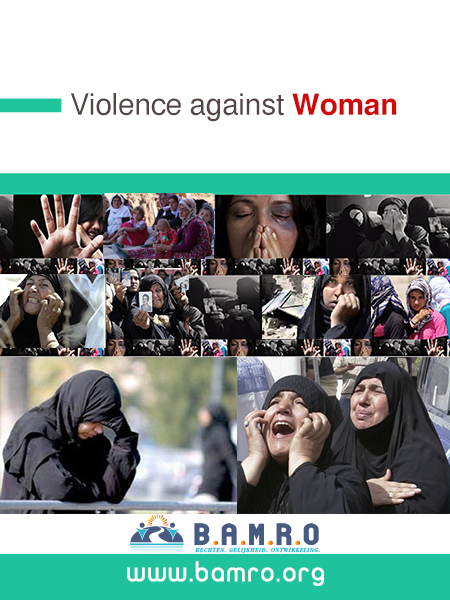Vote
-
For further training via the Zoom program or at our office? ?
Register a
Violation
We you
Contact youS.O.S.
0032 02 7322568
TPA
Aim of the session:
-Build coaches in charge of family relations development.
-Train councillors the specialty of which will be to interact with oppressed women and to reintegrate them in society.
-Train counsellors whose specialty will be to interact with young people with extremist ideas, help them moderate their ideas to reintegrate them into society.
-We will train through this class street workers the role of which will be to interact with homeless people and refugees.
-Train specialist counselors in the field of addiction in all its forms.
-The session’s targets are efficiency increase of marketing officers to make it easier to influence others.
This class’s profits in a general way:
-A better understanding of the psychological structure of your children and the improvement of the ability to better influence them.
-Through the techniques of this class you will be able to interact with refugees, homeless people, and oppressed women, reduce their suffering through a better understanding of their personalities.
-Being able to understand others requires a perfect understanding of one's own personality, a crucial step that is part of the benefits of this class.
-Coming from around the world, the number of registered participants has reached 100, registration is free and is available online for all those who live outside Belgium through our virtual coaching room on our website www.bamro.com.Org
Class summary:
In order to communicate and interact with others, whether with a young person with extremist ideas, an oppressed woman, a person with an addiction problem, or simply with a family member, one will be able to understand the person’s structure. Understanding the psychological aspect and the way of thinking of someone allows a better influence. This is what we will learn in this class, how to know someone’s structure.
What’s a representational system?What is its benefit? How to use it?
The representational systems are brain’s subconscious aspect related, Even if we have in common three representational systems, each one uses them in his own way, some dominate others. Despite having our five senses in common,
Each person receives, stores information and speaks differently. Each person has a representational predominant system that receives and analyses information. We discover the world thanks to the information which our brain receives via our five senses:
-The sight, the hearing, the touch, the smell, the taste.
Our brain processes this flows of information and then analyzes it, the input/output paths of its information are three main channels grouped, so-called in neuro-linguistic programming (NLP) the representational systems. These are:
-The visual representational system: resulting from a visual perception of something.
-The auditory representational system:resulting from a sound perception.
-The kinesthetic or (proprioceptive) representational system: resulting from somatic feelings (smell, taste, etc.)
Before defining each of these representational systems, it’s essential to say that there are no good or bad ones, Let’s consider them rather as a helpful toolsset for the understanding of our personalities and those of others, very useful therefore to interact effectively with others.
1-The visual representational system:
How to know if my own personality or that of another person is of the visual type:
1-The person breathes quickly, spasmodic and shallow breath, non-abdominal.
2-Speak quickly, loudly, move quickly in a dynamic way, looking usually up.
3-Promotes a thought and a mode of expression based on the visual, to give importance to the photographic support, linking things to images in general.
4-Base his decisions on what he sees or what he imagines an event is about.
5-Repetitive use of terms such as "imagine" or "look", such as telephone conversations, preferring to factually see the subject with his own eyes before decision-making.
Best way to influence and persuade a person of this type is to use the same communication mode, namely, speaking quickly and using terms that project an image on the concerned subjects so that your interlocutor feels familiar and understood.
Could you imagine how bad the impact of a different communication mode would be?Talking quietly, being calm, this could have a negative effect, your interlocutor may think you are insensitive, indifferent to his suffering, arrogant in an extreme case. There will be a great discrepancy.
If you are going to talk to a refugee, a homeless person or, in general, someone who needs psychological support, your best asset will be to use the same mode of communication as your contact, If he’s visual type, be visual, if it is of another type, you will have to adapt your communication mode depending on your interlocutor so that a trade and a mutual understanding can be. If you're talking to a person of a visual type, present things visually so that your contact sees what you’re talking about.
2-The auditory representational system:
The person whose auditory representational system prevails is a person who generally breathes in a relaxed and balanced way, voice’s intonation is variable and in the average, its aptitude to listen to others without interrupting them is very good, it can repeat most of what one tells her, is much more sensitive to sounds than the rest (image, places, etc.).
Unlike the visual type person, this person’s decisions are sounds and own elements analysis based. It uses terms such as "listening", "sound", "ringing", and "murmuring".
When speaking to an auditory type person, speak slowly and clearly, making your voice an influence asset. Your voice will have to be clear and audible by the person.
3-The Kinesthetic representational sense:
A person of the sensitive type will favour a slow and deep breathing, using the lower lungs as well as the ventral zone, her voice is usually deep and calm, she speaks slowly. This person is naturally calm, she generally looks down, and she pays more attention to sensations and emotions than the auditory or the visual type person. Her decisions are feelings based.
She uses terms such as "sensation", "emotion", "comfort", "happiness", etc. When speaking to a sensitive person, speak calmly and slowly. Share your emotions and be receptive to hers.
Notable remarks to understand representational systems:
Each person has the three representational systems (Visual, Auditory and Kinesthetic) but use them differently.
It doesn’t matter if a person’s nature (my father, my boss, my wife, my husband) is pleasant or not, most important thing is to create harmony and collusion with others depending on their representational system type to positively influence them and make them feel confident in your approach.
Listings
- 1
- 2
- 3
- 4
- 5









